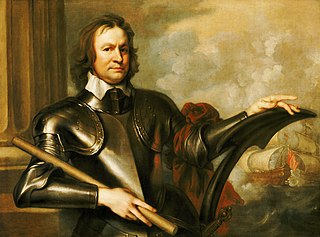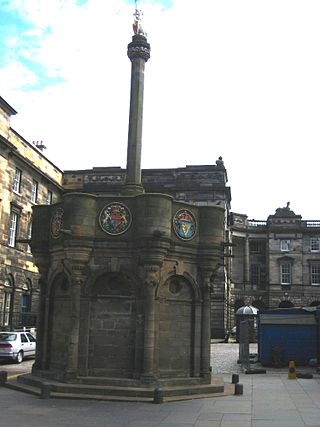
Oliver Cromwell was an English statesman, politician, and soldier, widely regarded as one of the most important figures in the history of the British Isles. He came to prominence during the 1639 to 1653 Wars of the Three Kingdoms, initially as a senior commander in the Parliamentarian army and latterly as a politician. A leading advocate of the execution of Charles I in January 1649, which led to the establishment of The Protectorate, he ruled as Lord Protector from December 1653 until his death in September 1658. Cromwell remains a controversial figure due to his use of the army to acquire political power, and the brutality of his 1649 campaign in Ireland.

Richard Deane was an English military officer who supported the Parliamentarian cause in the Wars of the Three Kingdoms. He was a General at Sea, major-general and one of the regicides of Charles I.

Sir Bulstrode Whitelocke was an English lawyer, writer, parliamentarian and Lord Keeper of the Great Seal of England.

Christopher Love was a Welsh Presbyterian preacher and activist during the English Civil War. In 1651, he was executed by the English government for plotting with the exiled Stuart court. The Puritan faction in England considered Love to be a martyr and hero.

The Wars of the Three Kingdoms, sometimes known as the British Civil Wars, were a series of intertwined conflicts fought between 1639 and 1653 in the kingdoms of England, Scotland and Ireland, then separate entities united in a personal union under Charles I. They include the 1639 to 1640 Bishops' Wars, the First and Second English Civil Wars, the Irish Confederate Wars, the Cromwellian conquest of Ireland and the Anglo-Scottish War of 1650–1652. They resulted in victory for the Parliamentarian army, the execution of Charles I, the abolition of monarchy, and founding of the Commonwealth of England, a unitary state which controlled the British Isles until the Stuart Restoration in 1660.
John Alured (1607–1651) was an army officer who fought for the parliamentary cause in the English Civil War and was one of the regicides of King Charles I in 1649.
The Committee of Both Kingdoms,, was a committee set up during the Wars of the Three Kingdoms by the Parliamentarian faction in association with representatives from the Scottish Covenanters, after they made an alliance in late 1643.

Robert Greville, 2nd Baron Brooke was a radical Puritan activist and leading member of the opposition to Charles I of England prior to the outbreak of the First English Civil War in August 1642. Appointed Parliamentarian commander in Staffordshire and Warwickshire, he was killed by a Royalist sniper at Lichfield on 2 March 1643.
James Temple (1606–1680) was a puritan and English Civil War soldier who was convicted of the regicide of Charles I. Born in Rochester, Kent, to a well-connected gentry family, he was the second of two sons of Sir Alexander Temple, although his elder brother died in 1627. As a child, Temple moved with his father from Rochester to Chadwell St Mary in Essex and then to Etchingham in Sussex, where he settled.

Walter Strickland was an English politician and diplomat who held high office during the Protectorate.
Sir Thomas Honywood was an English soldier during the English Civil War and later a Member of Parliament and also called to Parliament as Thomas, Lord Honywood. He was seated at Marks Hall, Essex.
Lt. Col. Samuel Mathews (1630–1660), Commonwealth Governor of Virginia, of Warwick County in the English Colony of Virginia, was a member of the House of Burgesses, the Governor's Council, and served as Commonwealth Governor of Virginia from 1656 until he died in office in January 1660. There was no Royal Governorship at the time of the "Protectorate", and the Governor technically answered to the Cromwellian Parliament, although Royalist sentiment was prevalent in the colony of Virginia at this time. The former Royalist governor Berkeley arrived to replace him on March 13, 1660.
Edmund Chillenden was an English soldier, known as an agitator and theological writer. At different times he was a Leveller and a Fifth Monarchist.

The reign of King James I of England (1603–1625) saw the continued rise of the Puritan movement in England, that began during reign of Queen Elizabeth (1558–1603), and the continued clash with the authorities of the Church of England. This eventually led to the further alienation of Anglicans and Puritans from one another in the 17th century during the reign of King Charles I (1625–1649), that eventually brought about the English Civil War (1642–1651), the brief rule of the Puritan Lord Protector of England Oliver Cromwell (1653–1658), the English Commonwealth (1649–1660), and as a result the political, religious, and civil liberty that is celebrated today in all English speaking countries.

Under Charles I, the Puritans became a political force as well as a religious tendency in the country. Opponents of the royal prerogative became allies of Puritan reformers, who saw the Church of England moving in a direction opposite to what they wanted, and objected to increased Catholic influence both at Court and within the Church.

From 1649 to 1660, Puritans in the Commonwealth of England were allied to the state power held by the military regime, headed by Lord Protector Oliver Cromwell until he died in 1658. They broke into numerous sects, of which the Presbyterian group comprised most of the clergy, but was deficient in political power since Cromwell's sympathies were with the Independents. During this period, the term "Puritan" becomes largely moot, therefore, in British terms, though the situation in New England was very different. After the English Restoration, the Savoy Conference and Uniformity Act 1662 and Great Ejection drove most of the Puritan ministers from the Church of England, and the outlines of the Puritan movement changed over a few decades into the collections of Presbyterian and Congregational churches, operating as they could as Dissenters under changing regimes.
Edward Bennett, was an English merchant based in London, and a free member of the Virginia Company. A Puritan who had lived in Amsterdam for a period, he established the first large plantation in the colony of Virginia in North America, in what became known as Warrosquyoake Shire.

Thomas Cromwell, 1st Earl of Ardglass, 11 June 1594 to 20 November 1653, was an English nobleman, son of Edward Cromwell, 3rd Baron Cromwell and his second wife Frances Rugge.
Eleazar Duncon was an English Royalist divine.

Cromwell's Act of Grace, or more formally the Act of Pardon and Grace to the People of Scotland, was an Act of the Parliament of England that declared that the people of Scotland were pardoned for any crimes they might have committed during the Wars of the Three Kingdoms. It was proclaimed at the Mercat Cross in Edinburgh on 5 May 1654. General George Monck, the English military governor of Scotland, was present in Edinburgh, having arrived the day before for two proclamations also delivered at the Mercat Cross, the first declaring Oliver Cromwell to be the protector of England, Ireland and Scotland, and that Scotland was united with the Commonwealth of England.










